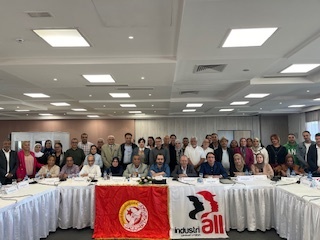Read this article in:
English
9 December, 2024Trade unions across the Middle East and North Africa (MENA) region have called for stronger measures to enforce due diligence on human and workers’ rights along supply chains. At a regional workshop held in Tunis on 13-14 November, organized by IndustriALL, union leaders highlighted pressing concerns about accountability, enforcement gaps, and the need for solidarity.
Participants from Morocco, Tunisia, Egypt, Jordan, Bahrain, Iraq, Lebanon, and Palestine, as well as European countries including Germany, France, Norway, and the Netherlands, attended the workshop.
Noureddine Taboubi, general secretary of the UGTT, stressed the importance of collaboration:
"Strengthening networks between unions across borders and developing tools to defend workers' rights will enhance solidarity and social justice. Economic and social rights are inseparable from fundamental freedoms. IndustriALL’s efforts in the region, especially Tunisia, are invaluable."
IndustriALL assistant general secretary Kemal Özkan underscored the role of due diligence laws in creating fairer supply chains:
"The tool of due diligence and recently enacted laws enable trade unions to hold companies accountable for their ethical and legal standards and practices related to their workforce. These binding rules are for ensuring to respect of labor and environmental conditions, while preventing exploitation. The enforcement of these standards is critical for trade unions for fundamental rights, particularly freedom of association and right of collective bargaining."
Participants raised concerns over limited accountability for multinational companies operating in MENA, where local laws often fail to guarantee decent working conditions or uphold trade union rights. Reports highlighted poor health and safety conditions and a lack of legal recognition for workers’ representation.
Ahmed Kamel, IndustriALL MENA regional secretary, emphasized the urgency of addressing these gaps as European investment in the region grows:
"Despite differing national contexts, networking and joint trade union action have made tangible progress in raising standards and fostering dialogue. We need robust tools and laws to defend workers in global production networks."
Trade union representatives from Europe shared their countries’ approaches to due diligence laws. Philippe Duchamp from industriAll Europe outlined the EU’s progress in legal frameworks that promote transparency and accountability, encouraging unions to leverage these mechanisms in their advocacy efforts.
Other speakers presented national models:
France: FGMM-CFDT executive committee member Benoît Ostertag emphasised union membership growth as a cornerstone for strengthening worker protections.
Germany: IG Metall’s Claudia Rahman highlighted litigation options available under Germany’s due diligence law to address violations, including child and forced labour.
Netherlands: Vivian Vaessen, policy advisor international affairs at FNV) discussed the Dutch experience with seven legislative attempts on due diligence, emphasizing its role in improving workers' conditions, enforcing collective bargaining, and protecting human rights.
Norway: Kathrine Fauske, deputy head of LO Norway’s international department, highlighted Norway’s focus on legal compliance, grievance mechanisms, and global labor solidarity while addressing the need for training programs and overcoming language barriers in supply chains.
Salouan Smiri, general secretary of Tunisia’s General Union of Petroleum and Chemicals (UGTT), stressed the need for stricter enforcement:
"While European laws mandate respect for human and trade union rights, these standards are often ignored in MENA countries. Serious action is needed to bridge this gap."
Habib Hazemi, IndustriALL vice president and general secretary of Tunisia’s FGTHCC-UGTT, said:
"European due diligence laws are a breakthrough for defending workers in the Global South. We’re already leveraging these mechanisms to tackle disputes with European firms operating in Tunisia."
Tahar Berbari, UGTT assistant general secretary for the private sector said:
"We are delighted to be working with IndustriALL. The cooperation is a boost for trade union work in the region, especially in the face of the serious impact of globalisation on the labour situation. Climate change, the fourth digital revolution, demographic change and ageing population are the main challenges facing workers and trade unions. Trade unionists need to be well prepared through training, networking and raising the level of global labour solidarity. That is why this workshop is so important.”
The workshop concluded with a unified roadmap to bolster workers’ rights in the MENA region. This includes intensified coordination on the operations of multinational companies, awareness campaigns on human rights due diligence, and targeted actions in key sectors such as automotive, aerospace, oil and gas, chemicals, and ICT.
Affiliates will continue to extend the work on due diligence at regional and country levels for further capacity building in cooperation with the sister unions outside of the region as well as the civil society and donor allies.







